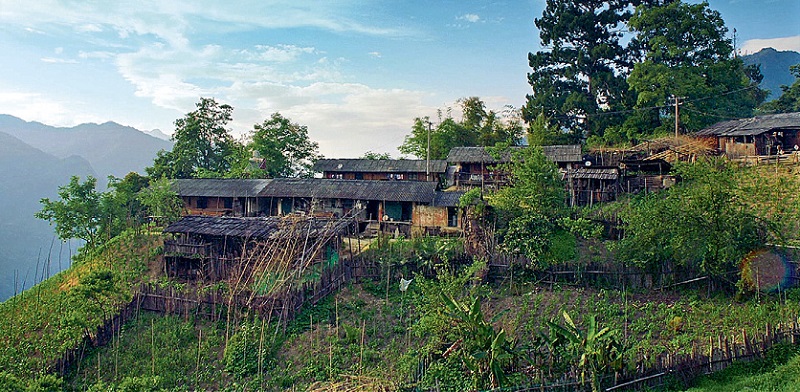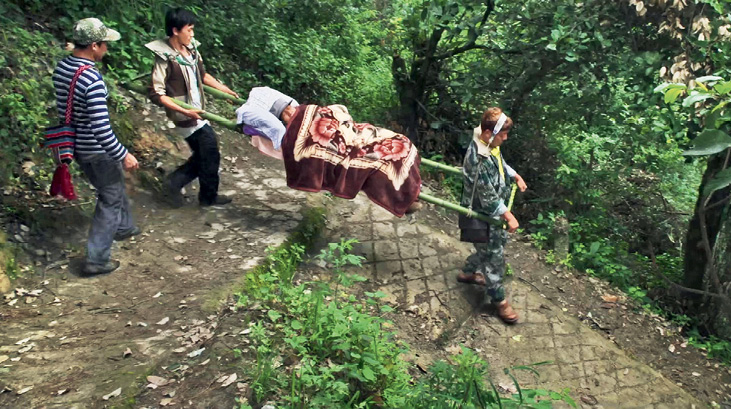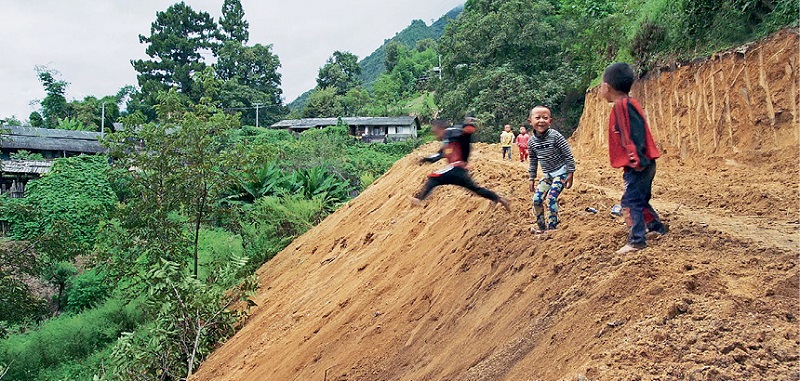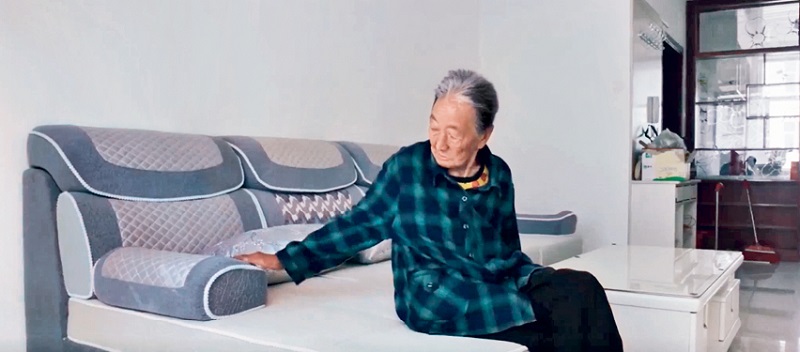
A still from Rooting, a documentary narrating how people in Shawa Village, located deep in the mountains of Yunnan Province, were lifted out of poverty.
It is impossible for most of us to imagine the anguish of poverty. Likewise, few of us understand why poverty is so difficult to eradicate.
Rooting, a documentary directed by Chai Hongfang that premiered in Beijing in April 2023, aids our imagination. So, too, does Farewell to Poverty, directed by Lu Guanghua and released in 2020.
Imagine the village of Shawa perched high on Biluo Snow Mountain in Yunnan Province. It is 2017. The 343 families, members of the Nu ethnic community, reside in traditional wooden houses, cooking on open fires. There is still no road to Shawa, just a narrow mountain track that takes two hours to scale by foot or mule. The paddy fields, to which villagers typically leave at sunrise, are an equal distance away, their retaining walls sculpted by hand each year from mountain soil. In spring, they form a precarious patchwork of reflective waters laced with the bright green of newly planted seedlings. This is where the story told in Rooting begins.
Xiaohuagou Village, 2,682 kilometers away in Shanxi Province in the Lüliang Mountains, already has a road; the town of Shuiyuguan is some 11 kilometers away. Farewell to Poverty opens with Jia Huanrong, a 53-year-old shepherd, walking up a barren hillside path weighed down by two buckets of river water, a carrying pole across his shoulders. He lives in a yaodong – a single tunnel-like room carved into the loess hillside – that he shares with his 80-year-old mother. Virtually every house in Xiaohuagou is a yaodong, “cave dwellings” made either of earth or stone. Huanrong’s mother is largely housebound, spending her days in the semi-darkness lying on a kang (brick or adobe bed) that half-fills the room, wrapped up against the biting cold.

The still from Rooting shows the precarious journey local villagers had to take from Shawa to the nearest hospital.
Shepherding 45 sheep, Huanrong can organize his working day to provide three meals for his mother that he cooks over an open fire. Water being scarce, bathing is rare, and washing up after meals is necessarily an art-form, rinsing every utensil from a single soup bowl of water.
Huanrong has a son away at college, but his wife left years ago ostensibly due to the remoteness and poverty of the village. This, it appears, is a common occurrence. It happened to both sons of elderly villager Wang Qiusheng who, with his wife, looks after the two grandchildren left behind. Qiu-sheng drives them down the hill to school each morning with all the other village children crammed into the back of his noisy three-wheeled truck. While children abound, most of their parents live as migrants in distant towns and cities, leaving the village “hollowed out” with few villagers making a viable living from the dusty yellowish soil.
With per capita annual disposable income being a mere RMB 6,000, Xiaohuagou is arguably the poorest village in Kelan County. Local officials have therefore decided that, for “a better life,” the villagers all need to move away to the town. This also allows for industrial restructuring and for the county to eradicate poverty as President Xi Jinping urged it to do when he visited Kelan in June 2017.
For a multitude of reasons, villagers do not want to relocate despite being told that they will receive a new heavily subsidized apartment, cheaper access to healthcare, the possibility of social assistance, and compensation paid on demolition of their homes. Cui Jianliang, the village head, reflects the views of older villagers: “Our ancestors’ graves are still here. We will remain here as well after we have died. Even though the old cave is so poor, we still don’t want to leave because it’s the place to call home.”
Wang Qiusheng speaks of the fears of many locals: “Frankly speaking, we farmers are dependent on the land. I’m afraid we won’t be able to survive in town, to live. How can we live without it [land]? That’s the biggest concern. Things are different in town. We need money for food, for vegetables, for everything!” His wife adds: “We don’t have any land in town. We are too old to find a job. How can we make a living?”
Another woman, crying profusely, raises practical issues: “I borrowed money to buy those sheep. If I leave, can I get enough money to pay the debt? I am not able to read. The only thing that I can do is raise sheep.”

The still from Rooting shows children playing along the road connecting Shawa Village with the outside world, which was under construction.
The poverty alleviation official responsible for Xiaohuagou, understanding the villagers’ concerns, requests that they be allowed to stay only to be rebuffed by his seniors: “You become the one who drags people’s feet.” Only through encouraging the village head to set an example, by moving out and to see his house demolished, is the opposition finally quelled.
Villagers in Shawa, led by Adengyan who is younger, emotional and articulate, also resist moving: “The government wants us to relocate but we wish to develop our home village because we have so many memories here... My most desperate request is to pave the road. Without a paved road, there won’t be a future here.”
The immediate problem to be addressed is the land that is left idle. With the policy of returning farmland to forest, growing corn as traditionally done is prohibited; the recommendation instead being to farm Sichuan pepper and urn orchid (used as a medicinal herb) under walnut trees. Given that trees take 10 years to mature, villagers lack strategy as to how to use the land in the interim. The problem is solved by poverty alleviation officials bringing in agricultural expertise and villagers begin planting millet.
Getting cash crops to market is, though, impossible – a point emphasized in Rooting with dramatic footage of a sick villager being stretchered down the slippery mountain path to the hospital, a precarious and painful ordeal.
The decision is taken to build a 23-kilometer road at an estimated cost of RMB 15 million (US $2.18 million) – a considerable investment for just 700 people. The villagers are jubilant. The road is built. Villagers plant protective trees and vegetation. Vehicles appear in the village. Children are driven to school. Shawa has a future.
Children are Shawa’s future. They are filmed not, as so often, regimented in classrooms but out playing as children do, making their contribution to village life. It is children who bear the greatest costs of poverty and who are likely to benefit most from its eradication. “This road will also influence our future generations,” Adengyan argues.

A still from Farewell to Poverty shows Jia Huanrong’s mother in their new home after relocation.
The joy of Shawa’s inhabitants is reflected in the rich vibrant colors captured by cinematographers An Tongqing and Wang Tong that contrast with the pastel ochres and blues found in Cao Hui and Zuo Ning’s portrayal of Kelan County. There, the cultural journey from cave village to town living seems much longer than 23 kilometers, let alone the 11 kilometers that it is by road.
This is apparent when villagers, shown their new apartments, cannot believe that each has more than one room, and when Huanrong looks in amazement at a door “openable from both sides.” The prices of food on display in a supermarket arouse consternation of Wang Qiusheng’s wife. Looking at a plastic wrapper she asks: ‘Is this ham sausage? So expensive!’ Then, inspecting vegetables, she observes: “We grow these [Chinese onions] in the village – and do not need to spend money! Sweet potatoes, need no money!”
The transition from poverty to modernity is lengthy. For Huanrong, with new apartments not yet available, there is no more space than before. Problems stack up: how to look after his mother if he works; finding a job when unskilled and over 50 years of age; paying school fees when out of work; securing a downpayment on an apartment given that he has spent his relocation compensation on paying off past debts.
Wang Qiusheng stares blankly out of the apartment window musing, “I do farm work but have no farmland now. I really don’t know what to do!” “They don’t need workers as old as you,” his wife opines, “We are really poor! No source of income. No stable salary.”
Despair dissipates somewhat when Qiusheng is granted social assistance and poverty alleviation officials negotiate Huanrong a job collecting refuse. Indeed, all come to agree, like Qiusheng’s wife, that “it’s definitely good to move here. We used to live in a cave dwelling, and we must get used to our new life here.”
For Huanrong, just imagine, a better life includes washing his face more often: “Tap water, it’s so convenient!” 
ROBERT WALKER is a professor with the School of Sociology, Beijing Normal University, and professor emeritus and emeritus fellow of Green Templeton College, University of Oxford. He is also a fellow of the Royal Society of Arts and the Academy of Social Sciences in the U.K.